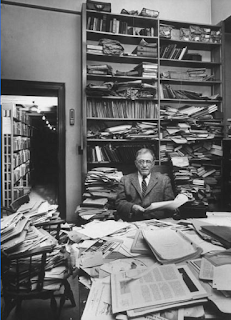Een preek van Spinoza – volgens Harry Austryn Wolfson
 Toen ik mijn blog “Was Spinoza averroïst?” voorbereidde, was het rijke The Philosophy of Spinoza van Harry Austryn Wolfson uit 1934 een van de boeken die ik raadpleegde. [Blog over Wolfson].
Toen ik mijn blog “Was Spinoza averroïst?” voorbereidde, was het rijke The Philosophy of Spinoza van Harry Austryn Wolfson uit 1934 een van de boeken die ik raadpleegde. [Blog over Wolfson].
Sindsdien heb ik er weer diverse hoofdstukken in gelezen. Dat is grotendeels genieten over hoe hij je vanuit zijn grote eruditie, alvorens bepaalde gedeelten van Spinoza te behandelen eerst meeneemt naar hoe Aristoteles en vele Middeleeuwse filosofen, zoals Gersonides, Crescas en vooral Maimonides de daar aan de orde zijnde kwestie behandelen. Dat leidt dikwijls tot groter begrip van welke oude vragen Spinoza in zijn stellingen aan de orde heeft en welke eerdere antwoorden hij of overneemt of (vaker) attaqueert.
Soms leidt het tot enige ergernis door een zeer eigenzinnige invulling door Wolfson. Om een voorbeeld te noemen: ook al geeft hij toe dat Spinoza een bewustzijn bij God niet uitdrukkelijk behandelt, construeert hij die overtuiging bij hem aan de hand van die vroegere filosofen en meent hij zo te laten zien dat Spinoza van Gods bewustzijn uitgaat, wel móet uitgaan, gezien de eenheid van zijn natuuropvatting - en hij de mens immers bewustzijn toekent. Dus…
In dit blog leek me wel aardig om zijn slotwoorden over te nemen, waarin hij Spinoza in zijn slothoofdstuk “What is New in Spinoza?” een viertal gedurfde vernieuwingen toekent en één waandenkbeeld, namelijk dat hij meende met een volkomen nieuwe theologie en religie te komen en niet door had, zich niet er bewust van was wat de betekenis van zijn radicale interpretatie van de oude theologie en wat de reacties zouden zijn van de gevestigde religies. En hij eindigt dan met Spinoza een preek in de mond te leggen.
Wolfson noemt in de volgende passage waarin hij die preek inleidt, doctor Cordes, de Lutherse dominee waar het gezin Van der Spyck, de huisbaas van Spinoza, kerkte, en waarheen Spinoza zelf ook wel eens meeging, zijn vriend. Dat moet zijn vrije vertaling zijn van wat Colerus over Cordes schreef: “was by hem [Spinoza] in een groote agting” [cf. blog].
Spinoza’s preek
[…] Spinoza, who defined man, after Aristotle, as a social animal, would undoubtedly have guided himself by the same dictate of reason that he had prescribed for others - by his maxim that man is freer when he participates in the life of society than when he lives in solitude. In conformity with this maxim of his, then, he would undoubtedly have joined in the active life of the communities in which he lived after his departure from his native Amsterdam — Rijnsburg, Voorburg, and The Hague; he would have become a substantial, respectable, and public-spirited burgher and a pillar of society. Perhaps, also, despite differences in theology, he would have joined the Lutheran church of his friend Doctor Cordes in The Hague. And I can picture him, once of a Sunday, at the invitation of the good old Doctor, taking the services in the church. He preaches a sermon which is an invective against what he styles "the prejudices of the theologians of our time." In it he inveighs against prevailing credulous beliefs in the spirituality of God, His personal relation to men, His direct guidance of human affairs, the divine origin of the Scriptures, human freedom of the will, the separability of soul from body, and the survival of the soul after death as an individual entity. The sermon over, he pauses and says, "Now let us pray." And in his prayer he thanks God, "the creator of the universe," for His bountiful goodness; he begs for the forgiveness of "our sins," asks for divine enlightenment in the true understanding of "Thy revealed Word," and petitions for divine grace in "guiding us in the paths of righteousness, to the end that "we may inherit" life everlasting and enjoy eternal bliss in the presence of "Thy glory." As he is about to close his prayer, he catches a glimpse of the congregation and suddenly realizes that he is in a Christian church. Immediately he adds: "In the name of Christ, the mouth of God, whose spirit is the idea of God, which alone leads us unto liberty, salvation, blessedness, and regeneration. Amen."

